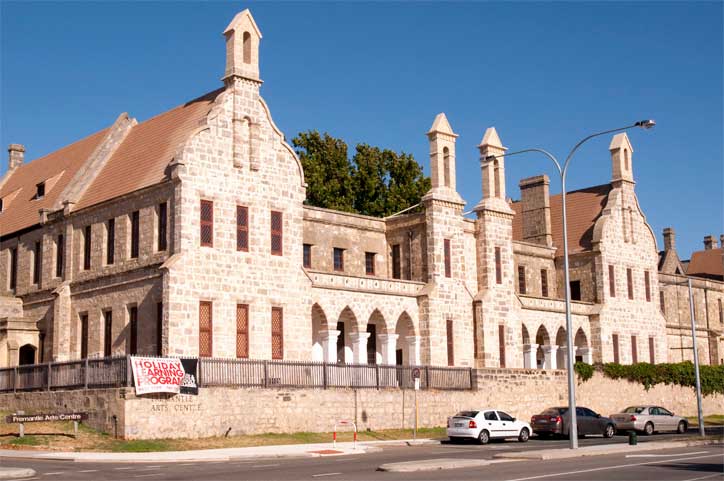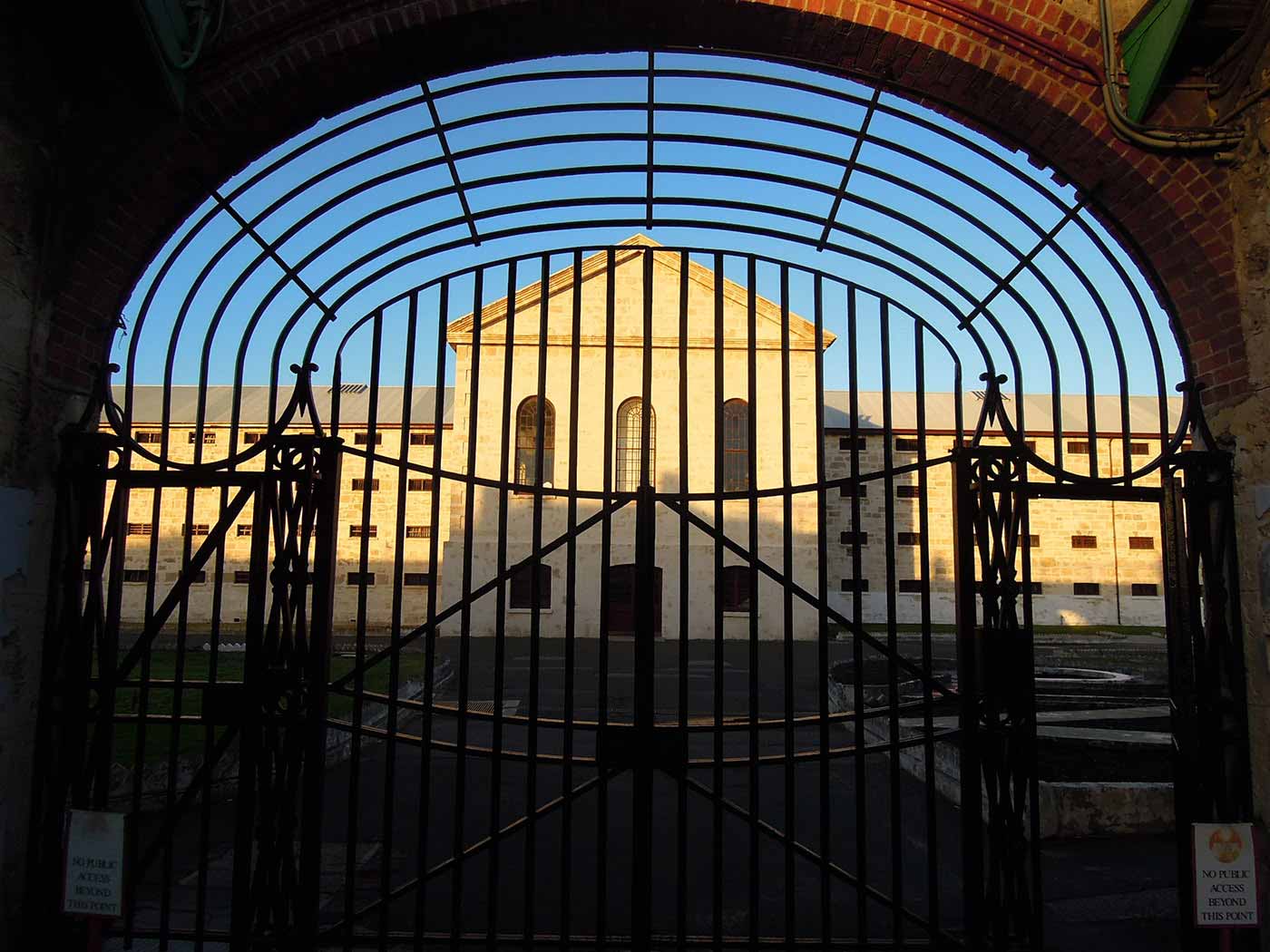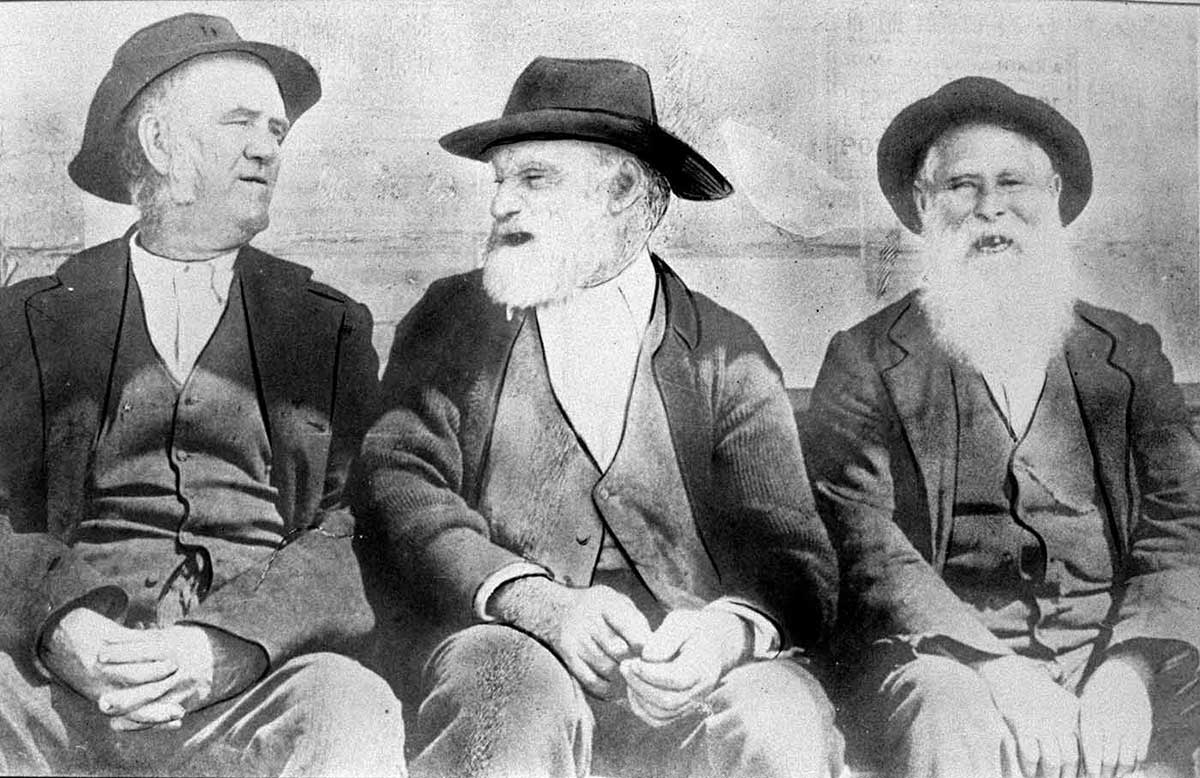In 1849 the British Government authorised the conversion of Western Australia from a free settlement to a penal colony.
On 9 January 1868 the convict transport Hougoumont arrived at the port of Fremantle. On board were 279 convicts, the last to be sent to Western Australia.
The ship’s arrival marked the end of 80 years of continuous penal transportation to the Australian continent.
Inquirer and Commercial News, Perth, 5 Feb 1868:
In future it is presumed that all who come to augment our population shall be virtuous. Henceforth, our neighbours [South Australians] cannot assume that stern and threatening attitude they thought it wise to present to the Home authorities and to ourselves.

Settling Western Australia
Since the establishment of a penal colony in New South Wales in 1788, Australia had served Britain as a prison and a means of offloading excess people during a period of rapid population growth, rising social and political instability and regular economic downturns.
While a significant portion of Australia’s population were themselves convicts or descended from convicts, and most had settled down to become law-abiding citizens, free settlers increasingly took an unfavourable view of convicts. They saw them as, at best, an often problematic source of labour and, at worst, a dangerous moral blight tainting their own and their colony’s reputation.
In contrast to the eastern colonies, the settlements in Western and South Australia were intended to be convict free.
The first settlers arrived at the Swan River in 1829, three years after a small military outpost had been established at King George’s Sound, now Albany, to head off any attempt by the French at taking over the western third of Australia.
The decision to found the colony was based on what can fairly be said was misleading reporting by Captain James Stirling who explored the area in 1827 and later became the colony’s first governor.
Having heard the lands of the Swan described as lush, fertile and productive, many settlers were appalled when they found themselves practising subsistence agriculture on what was little more than sand.
The economic depression of the 1840s – felt across all the Australian colonies – affected Western Australia very badly. The fledgling colony did not yet have sufficient population, capital or markets to weather the downturn.
The impact of a change in the official price of land was also severe, and a small group of pastoralists associated with the York Agricultural Society began to lobby for transportation, claiming it would supply a free source of labour that would solve many of the colony’s problems. Many in the colony disagreed with them, and initial proposals were defeated.
It was not until there was a change of governor that these proposals found a more sympathetic ear. Governor Fitzgerald, after whom Geraldton is named, liaised with London, which in May 1849 authorised the conversion of Western Australia to a penal colony.
Transportation to Australia ends
The news did not go down well in the eastern colonies. Opposition to transportation had been gathering in New South Wales from the 1830s, and received a boost when a friend of William Charles Wentworth – Robert Wardell – was murdered by a convict in 1834.
Opposition to penal transportation become so serious an issue that in 1837 the British Government established a commission of inquiry headed by Sir William Molesworth.
Molesworth, a Radical Member of Parliament, was sympathetic to causes such as colonial self-government and the abolition of slavery, and his commitment to these two causes had a significant impact on how he conducted the commission.
Molesworth’s inquiry looked into the effectiveness of transportation as a deterrent to crime, its moral impact on the colonies and what, if any, changes should be made. He found the system of assigning convicts to individuals was iniquitous, and recommended its abolition. He also condemned flogging.
Molesworth’s portrayal of colonial society as violent and morally suspect outraged colonists, but his report was favourably received by the Prime Minister Lord Melbourne’s administration and in 1840 transportation to New South Wales ceased.
However, transportation continued in Victoria, Queensland and Tasmania, and commenced in Western Australia in 1850.
In Convict Fremantle: A Place of Promise and Punishment, Michal Bosworth notes that Swan River colonists had already flirted with transportation when they accepted juvenile offenders, known as the Parkhurst boys, between 1842 and 1849.
The arrival of adult male convicts in 1850 and their labour over 20 years did have a significant economic impact on the struggling colony. They constructed essential infrastructure, such as the road from Albany to Perth and the Fremantle Bridge connecting Fremantle with the road to Perth.
Convict labour built many of what are now Western Australia’s most treasured heritage sites such as Government House and the Perth Town Hall, and significant sites in Fremantle such as the Fremantle Prison and the Fremantle Arts Centre, formerly the lunatic asylum.
Renowned author Tom Keneally discusses the end of convict transportation.
You may also like
References
Governor Charles Fitzgerald, online Australian Dictionary of Biography
Ordinance enabling transportation of convicts to Western Australia, Wikisource
Michal Bosworth, Convict Fremantle: A Place of Promise and Punishment, Fremantle Arts Centre Press, Fremantle, 2004.
Rica Erickson (ed), The Brand on his Coat: Biographies of Some of Western Australia’s Convicts, UWA Press, Nedlands, 1983.
Martin Gibbs, ‘The Convict Places of Western Australia’, in Building a Colony: The Convict Legacy, Jacqui Sherrif and Anne Brake (eds), Studies in Western Australian History, vol. 24, Centre for Western Australian History / University of Western Australia Press, Perth, 2006.
Alexandra Hasluck, Unwilling emigrants: Letters of a Convict’s Wife, Fremantle Arts Centre Press, Fremantle, 1991.
Isobelle Barrett Meyering, ‘Abolitionism, Settler Violence and the Case Against Flogging A Reassessment Of Sir William Molesworth’s Contribution to the Transportation Debate’, History Australia, vol. 7, no. 1, 2010.
Jacqui Sherrif and Anne Brake (eds), ‘Writing about convicts in Western Australia’, Bob Reece, in Building a Colony: The Convict Legacy, Studies in Western Australian History, vol. 24, Centre for Western Australian History / University of Western Australia Press, Perth, 2006.

